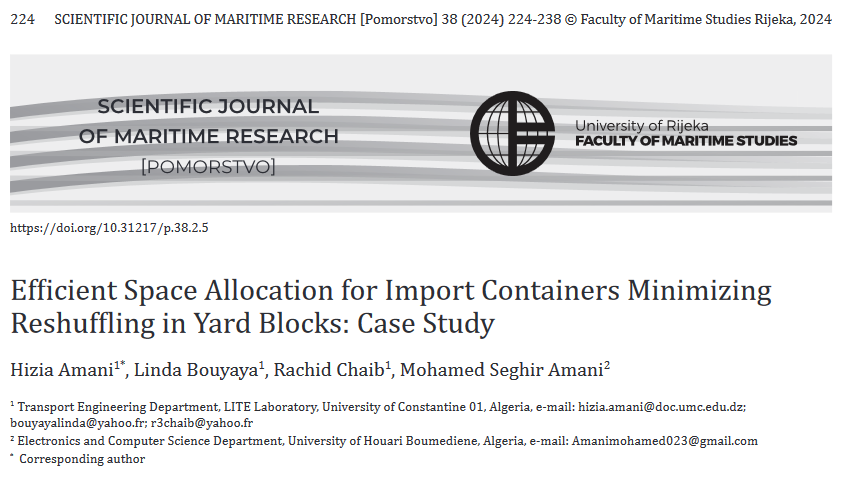EFFICIENT MANAGEMENT OF IMPORT CONTAINERS ALLOCATION IN A CONSTRAINED ENVIRONMENT
Keywords:
Maritime transport, Container storage problem, retrieval, genetic algorithm, container reshuffling, block allocation problemAbstract
Ports play an essential role in international trade, and any inefficiency can lead to costly delays and major disruptions. Therefore, the efficiency of port operations is crucial for the smoothness of global supply chains helping reduce the risk of congestion and accidents, thereby enhancing maritime safety. Optimizing container management is particularly significant in this context. Thus, the problem of storage space allocation problem is a critical aspect of managing port operations, significantly influencing the efficiency of the retrieval process and the number of reshuffles. This study proposes a new policy, aimed at optimizing the use of space for import containers in a constrained environment. This policy incorporates considerations to facilitate the retrieval process and reduce the expected number of reshuffles. As a case study, we have taken the Port of Annaba in Algeria. Using an improved genetic algorithm and a heuristic approach, we achieved up to 22% improvement compared to the existing port policy. This demonstrates the effectiveness of our policy in enhancing port operations within spatial constraints.

Downloads
Published
Issue
Section
License
Copyright (c) 2024 Hizia Amani, Linda Bouyaya, Rachid Chaib, Mohamed seghir Amani

This work is licensed under a Creative Commons Attribution-NonCommercial-NoDerivatives 4.0 International License.
Scientific Journal of Maritime Research understands the need for authors to disseminate and maximize the impact of their research. When submitting an article for publishing in Scientific Journal of Maritime Research, it implies that the Corresponding Author transfers, with the consent of all Coauthors, the copyright ownership in the referenced submission, including all versions in any format now known or hereafter developed, to the Scientific Journal of Maritime Research.
Copyright protects your original work and research material and prevents others from using it without your permission. Others will be required to credit you and your work properly, thus increasing its impact. Should your submission be rejected or withdrawn prior to acceptance for publication by Scientific Journal of Maritime Research, this transfer will be null and void.
Authors, users or readers of an article need clear instructions on how they can use the article. Scientific Journal of Maritime Research uses the Creative Commons Attribution-NonCommercial-NoDerivatives (CC-BY-NC-ND) 4.0 International License, which governs the use, publishing and distribution of articles by authors, publishers and the wider general public.
The authors are allowed to post a digital file of the published article, or the link to the published article (Scientific Journal of Maritime Research web page) may be made publicly available on websites or repositories, such as the Author’s personal website, preprint servers, university networks or primary employer’s institutional websites, third party institutional or subject-based repositories, and conference websites that feature presentations by the Author(s) based on the published article, under the condition that the article is posted in its unaltered Scientific Journal of Maritime Research form, exclusively for non-commercial purposes.




